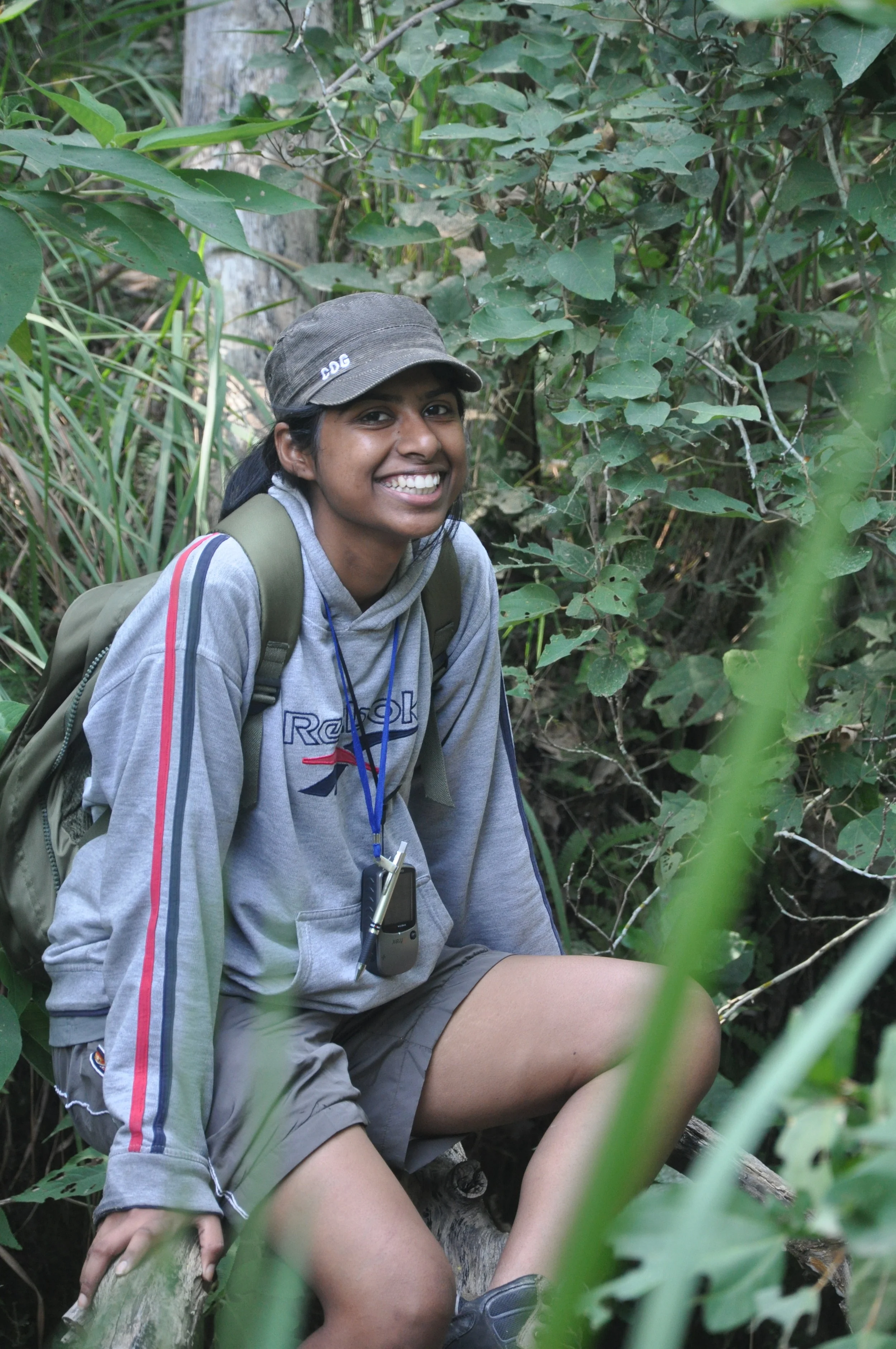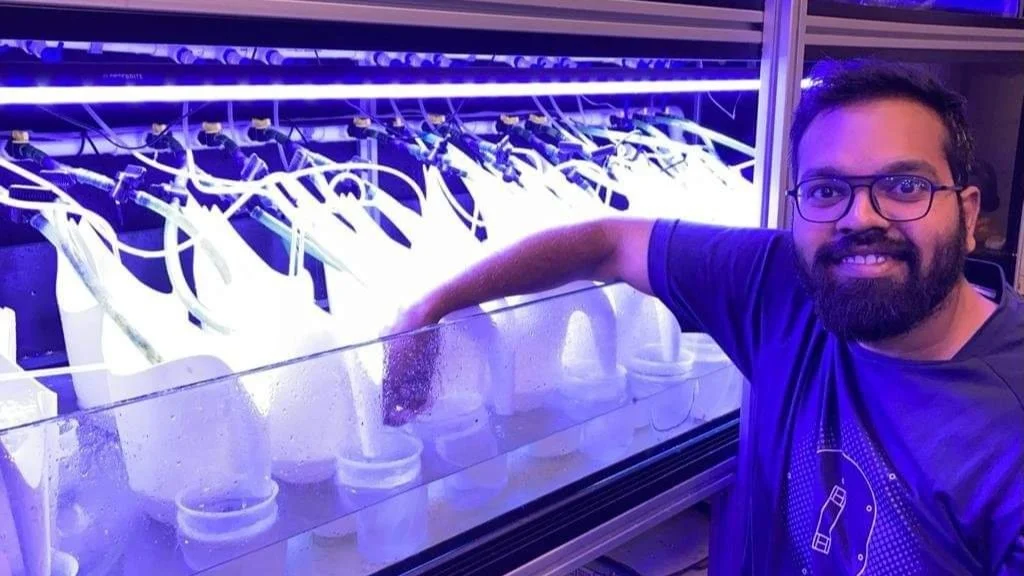Inlaks Ravi Sankaran Programme Recipients 2020
This week we are featuring the Inlaks Ravi Sankaran Programme (IRSP) Intern, Viral Joshi and Grantees, Saket Shrotri, Sayan Banerjee and Tanmay Wagh.
Viral Joshi - Intern
Recording Sholicola in Kodaikanal
I have been watching and recording bird calls for over a decade now. During my travels to the across the different landscapes across India, I have recorded more than half the avian species found in the Indian subcontinent. I believe that bioacoustics is an important tool for conservation research.
Spectrograph will help to visualized sound here sound Of White bellied-blue Sholakilli
Currently I am studying the song variation of White-bellied Sholakili (Sholicola albiventris) in the Shola Sky Island landscapes as a Project Assistant for the Avian Acoustics Project at Indian institutes of Science Education and Research, Tirupati. This endangered species belongs to the newly discovered genus Sholicola, a group endemic to the Western Ghats of India. My research also takes me a little east of the Western Ghats to the Palani Hills in Tamil Nadu. Here I am studying the patterns of avian communities of the landscape. I am interested in different types of vocal behaviors and would like to understand these complex behaviors with an ecological and conservation-oriented perspective.
During my upcoming internship at the Center of Conservation Bioacoustics, Cornell Lab of Ornithology, I plan to build species-specific automated detectors for the threatened, endemic birds of the Western Ghats. I imagine this will prove useful for research in wildlife and forest management, and to anyone with a recorder and an interest in bioacoustics.
Saket Sandeep Shrotri – Grantee
I am currently a second-year PhD student working in the field of plant ecology and evolution at Tropical Ecology and Evolution (TrEE) lab, IISER Bhopal. I am a strongly believe that conservation should go hand in hand with scientific studies of any community/ species/ ecosystem. My research aims to understand the diversity and role of indigenous bee species in the reproductive success of wild flora and agricultural crops.
Crop pollination in India is dominated by the non-native European bee- Apis mellifera, preferred due to its large colony size. Apis mellifera, however it is not economical for the small-scale farmers. Recent studies indicate that native Indian bees such as Apis cerana indica and Apis florea provide better pollination services under adverse weather conditions when the effectiveness of Apis mellifera is reduced. These two reasons lead us to believe that native Indian bees can provide ‘biological insurance’ for small farmers.
Our study focuses on documenting the diversity of bees and understanding the role of native bees as effective pollinators of agricultural and wild plants. We will be closely monitoring bee foraging pasture and effect of proximity of forest on pollination of agricultural crops around high elevated grassland community- Kaas plateau in the northern Western Ghats, Maharashtra. We have named our project as ‘Bee-India’ project, please follow our social media pages for timely updates about the same.
Sayan Banerjee - Grantee
Sayan in the field
I am a graduate student at the National Institute of Advanced Studies, Bengaluru, India. My interests lie in bringing forward interdisciplinary concepts and methods to wildlife conservation practice, policy and research. Presently, I am examining how behavioural interactions between humans and Asian elephants impact political ecology of elephant conservation in Northeast India and vice versa.
Elephant in tea garden at Udalguri, Assam
This project intends to understand the human-elephant interactions by holistically examining elephant ecology and behaviour, patterns of livelihood and lifestyle of local communities, behavioural interactions between human and elephants during encounters and people’s perceptions and attitudes towards elephants. This project will be situated at the Dhansiri forest division of Udalguri district in the state of Assam, India. Dhanisiri forest division falls under the easternmost buffer area of Manas Tiger Reserve and is a part of Ripu-Chirang Elephant Reserve. The present project will integrate research methods pertaining to animal behaviour and social sciences. It will provide us with an on-ground understanding of how relations between humans and wild elephants are slowly being established in a conflict-ridden landscape as well as potentially allow us to develop strategies that would ensure more convivial relationships between humans and elephants in the future.
Tanmay Wagh - Grantee
Underwater reef surveys to understand the impacts of fishing of reef fish and coral reef health
I am a marine biologist based out of the Andaman and Nicobar Islands since 2013. Over my time on the islands, I have worked on projects related to coral reef ecology, seagrass ecosystems, sea turtles and fisheries. My broad interests are in understanding the relations between fisheries and marine systems, and the scope of integrating community participation in local management efforts.
Surveys at fish landing centres to study the fish catch and engaging in conversations with the fishers
The Andaman Islands are a unique system which have been traditionally reliant on small-scale and often sustainable fishing practices. Coral reefs and fish, which form an integral part of the social and cultural well-being of the islanders, are rapidly declining due to the rise in climatic disturbances and the growth of unsustainable fishing practices. Adopting and promoting sustainable and small-scale fishing practices will not only ensure community well-being by sustaining reef resources, but will also prepare reefs to absorb and recover from catastrophic climatic shifts. My current research aims to study these links by understanding various social, cultural and ecological factors influencing small scale reef fisheries in the Andaman Islands and exploring the scope for initiating participatory community-based fisheries monitoring.














